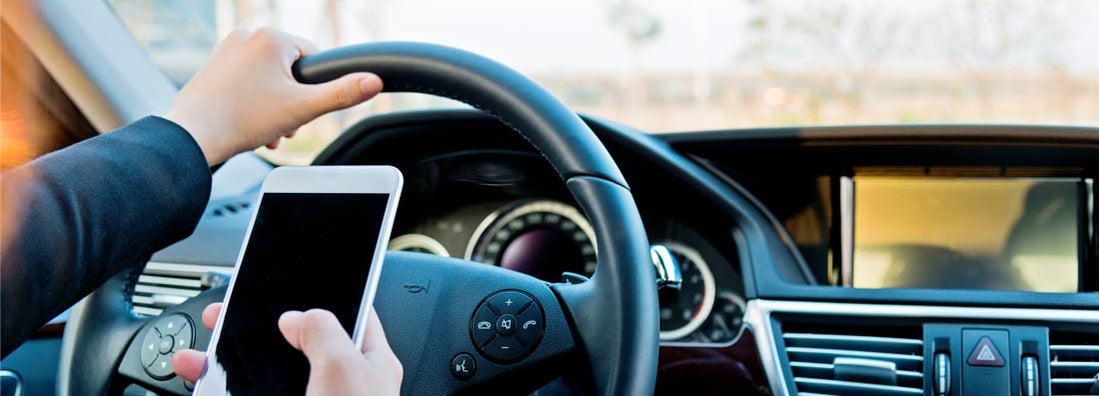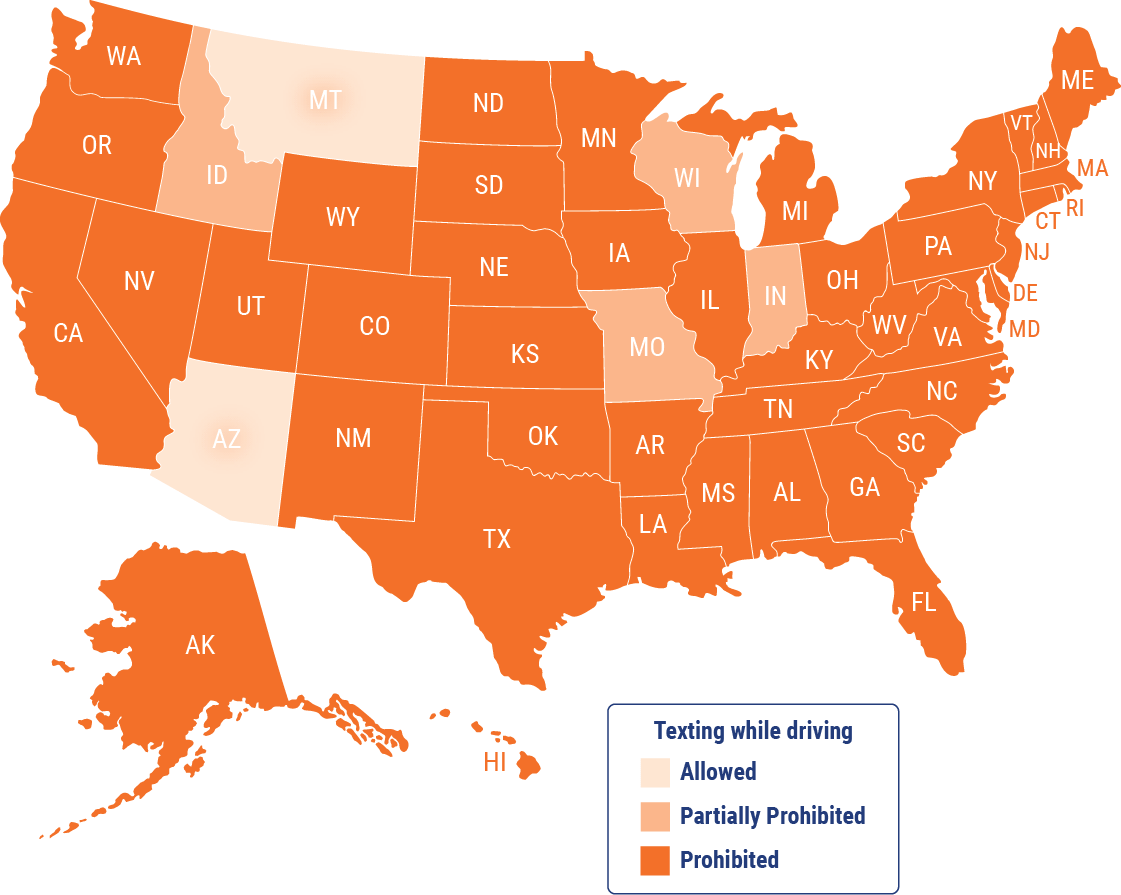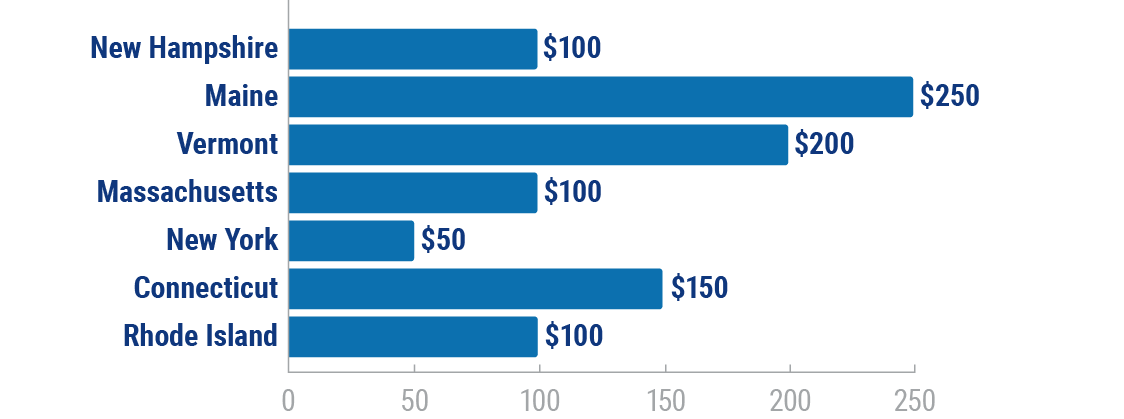New Hampshire Distracted Driving
(It's more than just not texting)

There are thousands of car accidents every year in New Hampshire. And most of these are simple distracted driving mistakes that are completely preventable.
That’s why arguably THE most important thing you can do behind the wheel is keep your hands at 10 and 2 and your eyes on the road. Always.
What Is Distracted Driving?
Distracted driving is the act of engaging in any activity that takes your attention off the primary task of driving.
There are three types of distractions:
- Manual: anything that causes you to take your hands off the wheel, like eating, smoking, or reaching for an object
- Visual: anything that causes you to take your eyes off the road, like looking at a GPS, checking your hair in the review mirror, or looking at kids in the backseat
- Cognitive: anything that causes you to take your mind off the task of driving, like having a conversation with a passenger, going over your shopping list in your head, or daydreaming
New Hampshire’s distracted driving laws are focused mostly on curbing cell phone use while driving, but really that's only a small piece of the distracted driving puzzle.
Distracted Driving Statistics in New Hampshire
You don’t have to follow the local news every night to know that distracted driving is a problem, but here are a few statistics that might help you understand just how serious it is in New Hampshire:
- In 2011, about 52% of drivers owned smartphones. By 2014, that number had increased to 80%, making the need for distracted driving laws more vital.
- New Hampshire’s hands-free law went into effect in July 2015, making this the 13th state to ban the use of handheld devices while driving.
- The law has been effective; the number of distracted-driving fatal crashes in New Hampshire decreased from 18 in 2013 to just 2 in 2016.
- In the first 18 months following the passage of the hands-free law, state police issued more than 4,300 citations and 4,282 warnings to drivers who were using handheld devices while driving.
- This number has been steadily declining as people are getting used to putting their phones down until they reach their destinations.
Does New Hampshire Have Laws against Distracted Driving?
Yes.
New Hampshire currently prohibits:
- The used of handheld cell phones or other handheld wireless communication devices
- Text messaging and related activities (like web browsing)
- The viewing of TV broadcast signals
- Drivers under the age of 18 from all mobile electronic device use, even hands-free.
New Hampshire compared to the rest of the US on texting and driving restrictions

Every state in the US has a law that prohibits some sort of cell phone usage except Montana and Arizona. But in 2021, newly enacted cell phone restriction laws will go into effect in Arizona.
Are There Any Exceptions to New Hampshire's Distracted Driving Laws?
Yes.
The state of New Hampshire makes the following exceptions to its distracted driving laws:
- Drivers may use a handheld cell phone for the purpose of calling 911 or any other public safety agency to report an emergency.
- Drivers under the age of 18 may use their cell phone to call 911 or any other public safety agency in an emergency.
- GPS and other navigational systems may be used, but only if done in hands-free mode and if the unit is integrated into the vehicle or mounted on the dashboard, windshield, or visor of the vehicle.
- Drivers with a license to do so may use one hand to operate a two-way, non-cellular radio.
- Drivers are permitted to perform acts required by an ignition interlock device (IID).
New Hampshire Distracted Driving Laws at a Glance
| Yes | No | |
| Is texting while driving legal? | X | |
| Can you send/receive texts at a red light? | X | |
| Is handheld device use permitted? | X | |
| Any special restriction for young drivers? | X | |
| Is headphone/headset use permitted? | X |
Is It Legal to Eat a Cheeseburger While Driving in New Hampshire?
Yes. And no.
Distracted driving comes in many forms, and eating a cheeseburger can be just as distracting as talking on a cell phone.
So what happens if a police officer in New Hampshire sees you eating a cheeseburger while driving down the highway? Well, that depends. While there's no law that says you can't eat while driving, the state does have laws against reckless or negligent driving.
This means that if the distraction caused by reaching for another fry or wiping a blob of mustard off your shirt causes you to drive erratically, you may be pulled over and cited for a moving violation.
Unless you are really in a hurry, you’re better off eating your Whopper indoors or in the parking lot.
What's the Difference between Primary and Secondary Enforcement of Distracted Driving Laws?
Primary enforcement of distracted driving laws means the police can pull you over if they see you violating state distracted driving laws.
Secondary enforcement of distracted driving laws means the police can cite you for violating distracted driving laws only if you break another law while doing so.
New Hampshire uses primary enforcement.
This means that if a police officer sees you texting or talking on a handheld cell phone while driving, you can be pulled over and given a citation – even if you were in total control of your vehicle the whole time.
What's the Fine for Distracted Driving in New Hampshire?
In New Hampshire, the penalties for a distracted driving citation include:
- For a first offense: $100, plus points on your driving record
- For a second offense: $250, plus points on your driving record
- For subsequent offense within a two-year period: $500, plus points on your driving record
New Hampshire’s fines for distracted driving compared to surrounding states

Your costs are not limited to the fines listed above. Court costs and fees will be added to your fine, making it even higher. But the financial penalties don’t end there – which brings us to our next topic: car insurance.
Does a Distracted Driving Citation in New Hampshire Increase Insurance Rates?
Yes.
Distracted driving is a moving violation in New Hampshire, and since points are assessed against your driving record when you're cited for this violation, your insurance company will know about it.
As a result, your rates will almost definitely go up. The amount of the increase depends largely on which insurance company you use and your overall driving history. In New Hampshire, drivers see an average increase of $456 a year following a distracted driving citation—that’s almost $40 a month.
And if you have a safe driver discount, you can probably kiss that goodbye. Distracted driving will almost certainly disqualify you from receiving this discount, and this can cause your rate increase to be even more painful.
So ask yourself, is that text message or phone call really worth the potential cost?
What If I Drive into Another State?
Distracted driving laws vary by state, and when you cross that state line you are required to follow their laws. Claiming ignorance of the law will not get you out of a citation, so be sure to check on the current laws for any states you may be traveling through before you take your next road trip.
At this time, you are unlikely to find yourself driving through a state with tougher distracted driving laws than New Hampshire, so if you continue to behave as you do in this state, you should be just fine.
What's New Hampshire Doing To Prevent Distracted Driving?
The recent passage of the hand-free law in New Hampshire demonstrates that lawmakers in this state are aware of the hazards created by distracted driving and are willing to do something about it.
State police are happy to report that they see far fewer drivers on their phones now that people have grown accustomed to the state’s new laws.
So What Can You Do?
Quite simply, just put the phone away — even if that means in the glove compartment. The fines themselves are definitely not worth it, let alone the more serious consequences to you and others on the road. Let’s all just get where we’re going safely and save the texting until you get home.
https://www.nhtsa.gov/sites/nhtsa.dot.gov/files/documents/new_hampshire_fy2018_hsp.pdf
http://www.gencourt.state.nh.us/rsa/html/xxi/265/265-79-c.htm
http://www.gencourt.state.nh.us/rsa/html/XXI/265/265-105-a.htm
http://www.gencourt.state.nh.us/rsa/html/XXI/266/266-75.htm
